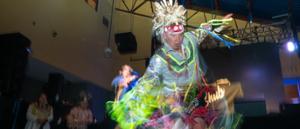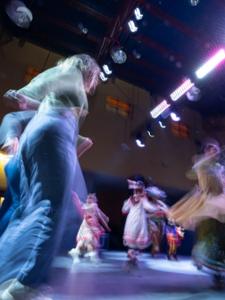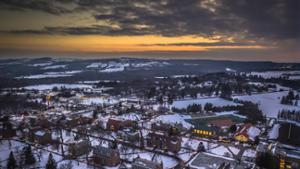
American Indian and Indigenous Studies
The American Indian and Indigenous Studies program is both interdisciplinary and extradisciplinary, spanning academic departments, disciplines, and fields of inquiry to integrate Indigenous ways of knowing and knowledge across the curriculum. The program will provide learning opportunities through an innovative, community-based, and reciprocal partnership with the Oneida Indian Nation. Learning opportunities within AIIS will contribute to honoring the 1793 Promise – the foundation and establishment of the Hamilton-Oneida Academy through a gift from the Oneida Indian Nation.
- Recognize the significance of different forms of knowledge produced by Indigenous leaders, writers, artists, or activists within its cultural and historical context.
- Describe historical events and cultural contexts that shaped Indigenous communities prior to colonial contact
- Analyze specific examples of Indigenous peoples’ encounters with different forms of colonialism and assess their immediate impacts.
- Interpret the long-term consequences of colonialism for Indigenous communities across historical and contemporary periods.
- Explain how contemporary Indigenous communities assert agency, practice sovereignty, and envision future futures in response to ongoing colonial structures.
A Sampling of Courses

Seminar: Indigenous Ecologies
This interdisciplinary seminar explores the traditional ecological knowledge (TEK) of indigenous peoples. Drawing upon scholarship from such diverse fields as acoustic ecology, ethno-ecology, ethnography, geography, environmental history, Native American and Indigenous Studies, and religious studies, we will examine indigenous knowledge about particular species and relationships between them.
Explore these select courses:
The course serves as an introduction to the interdisciplinary field of Native American Studies, exploring both the complexity and diversity of Native American experiences. Students learn about both historical and contemporary events and issues from Indigenous perspectives and develop new ways of thinking and talking about - and with - Native Americans.
This class follows the violent emergence of a new society in the Americas in the half-century from Columbus’s encounter with the Caribbean in 1492 through Cortés’s and Pizarro’s lightning conquests of the Aztec and Inca Empires. It examines the interactions between indigenous peoples and Europeans in conjunction with Spain’s moral crisis over the brutality of its own imperial regime. Analyzes primary sources (Spanish, indigenous, and mixed) and explores how historians make meaning out of the past by using texts, records of warfare, bodies, and the environment as sources of evidence.
This course will focus on contemporary literature, film, poetry, and creative nonfiction written by North American Indigenous authors from various nations within both the United States and Canada with attention to colony and empire, climate change, sovereignty, emergent indigeneity, and multispecies kinship. As much as possible, we will place these texts within their historical, culturally-specific, and national contexts, as well as in relation to each other and to ourselves in our classroom at Hamilton. Texts may include works by Louise Erdrich, N. Scott Momaday, Leslie Marmon Silko, Robin Wall Kimmerer, Leanne Simpson, Rebecca Nagle, Lisa Jackson, Stephen Graham Jones, Thomas King, Tommy Pico, Cherie Dimaline, and Danis Goulet.
Bioprospecting is the process of exploration of the nonhuman natural world for new resources that have social, medical, and commercial value. Today, pharmaceutical companies search for natural products with biochemical potency to discover unknown natural products and drugs. This impulse emerges from a long tradition in which imperial powers dispatched bioprospectors to make the natural wealth of so-called “New Worlds” have value. This course follows the entangled history of medicine and the exploitation of the natural world from early modernity to the present. Students will have the opportunity to take part in the Global Pharmacopeias research collaboration between Harvard University and 91��Ƭ��. The course is writing intensive with a focus on research methods in history, the history of science, and interdisciplinary collaboration. It is suitable for students with a background in history, pre-med, chemistry, the life-sciences, and/or environmental studies.
This course interrogates the “official” definitions and narratives that shape our understanding of the environmental crisis, first by exploring how climate change, the Sixth Mass Extinction, and The Anthropocene have been defined, and then through exploring their roots, the political ramifications of these definitions, and the groups who have been traditionally left out of the institutions that define these terms. Turning to these voices, we will problematize the “official” and institutional understanding of these concepts, learn how Indigenous communities have been affected by the climate crisis, how they are working for resilience, and how they reimagine our current moment not just as one of apocalypse, but also one that inaugurates a new beginning.
Meet Our Faculty
Nathan Goodale
William R. Kenan Jr. Professor of Anthropology, Associate Provost, Co-Director of Geoarchaeology
complex hunter-gatherers in the interior Pacific Northwest; the forager/farmer transition in Southwest Asia; rural coastal adaptations in western Ireland
Native and Indigenous Studies, Environmental Justice, Climate Change studies, Animal Studies, and Environmental Humanities
Mackenzie Cooley
Associate Professor of History, Director of Medieval and Renaissance Studies
History of science; early modern world; Colonial Latin America; environmental history; intellectual history; digital humanities; history of gender and sexuality; animal studies; genetics and history
climate change; invasive species; novel ecosystems; plant-animal interactions; seed predation
Anthropology of religion; global Christianities; religion in America; Native American religious traditions; traditional ecological knowledge; pilgrimage; personhood and place
Faces & Spaces


Explore Hamilton Stories

Mellon Foundation Awards Hamilton $750K for American Indian and Indigenous Studies
The Mellon Foundation has awarded 91��Ƭ�� a $750,000 grant to establish a program in American Indian and Indigenous Studies (AIIS).

The Climate Crisis and Indigenous Voices
Krystal Two Bulls, an Oglala Lakota and Northern Cheyenne, walked into a 91��Ƭ�� classroom last week and uttered under her breath, “Oh wow, it’s packed.”
Contact
Department Name
American Indian and Indigenous Studies Program
Contact Name
Nathan Goodale
Clinton, NY 13323






